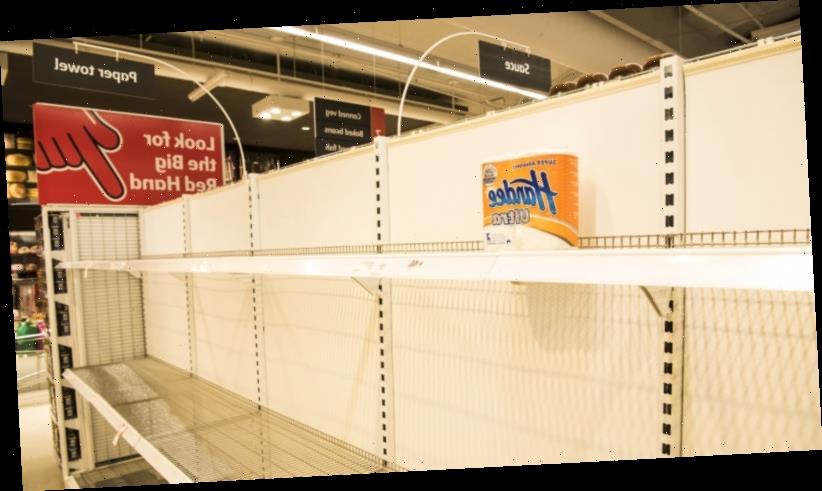One day, when this whole coronavirus episode is mostly a memory, someone will write a PhD trying to explain the great toilet paper panic of 2020. I eagerly await the chance to read it because whatever answers it generates will almost certainly shed light on some fundamental aspect of the human condition.
This ritual clearing of supermarket shelves is so irrational that it simply must be pre-rational: not failed reasoning so much as something that kicks in before reasoning even begins. Even those in its throes of this panic-buying seem to struggle to offer a clear, intelligible explanation.
Every one I’ve come across seems to boil down to “it makes me feel better about things”. And that’s precisely why I think the true reasons – perhaps undiscoverable to those doing the buying – are likely to be so important.
Lucky last?Credit:Steven Siewert
For now, in the absence of that PhD, we can only speculate. And my speculation is that this has nothing to do with material need, and everything to do with a deeply psychological one: specifically, control.
As we watch everything from schools to sporting stadia to an entire country enter lockdown, and as we hear predictions that half our nation might end up with the coronavirus, there’s this sense that we’re battling something ultimately unstoppable, like we’re trying to hold back smoke.
It’s fear, sure. But we fear lots of things. This is worse than that. It’s helplessness.
People instinctively recoil at that feeling. Deep within us lies the conceit that we’re in charge of what happens to us; that there is a solution available to us for every problem. This gives our lives a sense of predictability and reliability.
We don’t necessarily mind surprises, even nasty ones, as long as they don’t disturb our fundamental sense of how things generally work. This isn’t just any ordinary sense of security we’re talking about here. It’s existential.
What happens when that turns into an existential anxiety? Well, this. The fight against a pandemic is ultimately one of containment, of control.
And if you’re not an epidemiologist who instinctively views this sort of thing through the prism of data, subject to something like a set of equations you can understand, and if you’re ultimately beholden to authority figures who do very serious things but even then admit they can’t control the spread of the virus such that you’ll probably get it, you quite likely feel very much out of control.
So you try to reclaim it. By doing something. Anything. Toilet paper? Sure. It just needs to be some little corner of our lives that we can now say for sure is sorted.
If this is even close to correct, then it actually has much to tell us about our broader social and political world. Look around and you’ll quickly see that control is perhaps the dominant theme of our political age.
Why do Brexit? To “take back control”. Why persist with a brutal offshore detention regime, or build a wall along the border and separate children from their parents in the name of immigration policy? To keep control of your borders. Why impose tariffs on foreign steel and aluminium even though it comes at significant economic cost? To control the fortunes of a struggling manufacturing sector.
Why rail against elites? To reclaim control on behalf of the people. Why believe that fuel reduction is a more relevant cause of unprecedented megafires than climate change? Because as a single nation, we can control fuel reduction, but climate change is beyond our control.
Why get upset that Scott Morrison had a Hawaiian holiday at the start of the fire season when he doesn’t have a practical role? Well, lots of reasons but at least partly because we wanted him to look like he was in control.
Often these are populist responses, which makes sense because populist politics is all about postures of strength and control. It doesn’t matter that much of this control, a bit like that gained from hoarding toilet paper, is a mirage. What’s telling that is that we’re in such a populist moment; that this brand of politics is so conspicuously potent.
I think it’s because lacking control is now the default state of human life. We may not always appreciate this explicitly because as we go through life it’s masked to a greater or lesser degree. But it’s always true to some extent.
We’re less in control of our economies, our jobs, our culture, our national news diet, our levels of immigration, and now it seems even our health. All the social and political institutions that were created to control such things – chief among them the nation state – have less control than ever.
That’s precisely the point of globalisation: that control is handed over to abstract, decentralised economic and social processes that are extremely powerful and no one really controls.
For decades, we’ve clung on to narratives to restrain this. It could be an overarching belief in human progress, for instance, which allows us to believe that even if some things were evolving, they obeyed some arc of history and were therefore under control. Or it might have been that these globalised processes would deliver greater wealth.
As long as we believed such things, an alternative to the politics of control – the politics of hope, or the politics of prosperity, for example – was possible. But strip those away, and the loss of control is all you have left.
Taken this way, the empty shelves that once held toilet paper work as a metaphor for what’s always rumbling away beneath the surface. We’re all a little panicked these days. We just have many varied ways of showing it.
Waleed Aly is a regular columnist.
Source: Read Full Article

